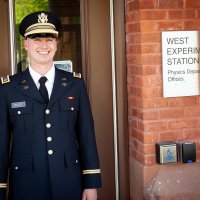
“My driving force is the desire to lead, inspire, and learn from the teams working on society’s largest problems to find the right solutions that have a positive impact on the world.”
The pandemic was no match for Jack Moody, who published an op-ed titled “Staying Motivated and Productive During Covid-19 as an Undergraduate Student” for the American Physical Society’s newsletter, and then spent that summer of 2020 interning for the APS.
From an early age Jack has been drawn to physics because of “its ability to answer things in clear, fundamental terms,” he says. He graduated this year with a degree in physics from the College of Natural Sciences at UMass Amherst, a certificate from the Integrated Concentration in Science (iCons) program, and a minor in math.
Upon graduation, Jack commissioned as a Cyber Officer in the US Army and is currently stationed in Augusta, Georgia.
Jack credits much of his success to the home he found in the UMass Physics department and the iCons program, which he says equipped him with elite skills in research design, teamwork, and communication that made him a top candidate for his current post.
The iCons Program helps students build skills in collaboration, communication, leadership, and interdisciplinary thinking to serve as the 21st century’s technical workforce. The program is based on the premise that while deep technical expertise is critical to solving the world’s biggest problems, it is also essential to have experience with real-world scenarios and work with people across many disciplines.
Case in point: According to feedback Jack received when starting an internship, what put him over the top was his participation in the Renewable Energy Track of the UMass iCons Program. He says it equipped him with skills in critical thinking, organizational leadership, team building, and public speaking.
![]() Jack is the oldest of five children and the first in his family to attend college. His early childhood home situation was complicated, but when he was adopted at age 17, his future started looking brighter. “The thought of going off to college one day provided me with a goal to anchor myself to throughout my life,” he says. He cherishes the time he spends with his younger siblings and strives to be the best role model for them.
Jack is the oldest of five children and the first in his family to attend college. His early childhood home situation was complicated, but when he was adopted at age 17, his future started looking brighter. “The thought of going off to college one day provided me with a goal to anchor myself to throughout my life,” he says. He cherishes the time he spends with his younger siblings and strives to be the best role model for them.
Though he felt out of place when he first came to the UMass campus, the CNS programs helped Jack “cultivate lifelong friendships and become part of a community of academically-minded colleagues who were just as curious about the world as I was,” he says. “I am so grateful for that opportunity.”
Jack has been a great example of paying that gratitude forward. While an undergrad, he worked as a Resident Assistant for two years. He also mentored six first-generation students in STEM through the Forsythe Grange Peer Mentoring Program. As a mentor, he enjoyed providing the kind of guidance he says he desperately needed as a freshman. “This was, by far, the most meaningful program I did in undergrad. I enjoyed helping get the best out of the people around me and producing the best solution for their personal success.”
His iCons professor, Christine McGrail, describes how Jack’s powerful Army training and leadership skills contributed high-level military-style planning for a semester-long team project on the Vanadium Redox Flow Battery.
Jack established a workflow from the leader to the main researcher, to the drafter, to the proofreader, and back to the leader for uploading. “It was a phenomenal approach to teamwork under stressful conditions,” McGrail says. “Jack’s team became one of the strongest and most effective, moving across the finish line without ever letting up, or as Jack would say, ‘ensuring mission success.’”
Talk about trailblazing: Jack was the first UMass student to get an internship at the Defense Threat Reduction Agency (DTRA) with contracting company Leidos over the summer of 2020 and through his senior year. This led to his senior research on nuclear weapons effects related to fratricide prevention. His work utilized a variety of image analyses and computer vision techniques and is designed for use in many defense applications and in the broader weapons effects community.
Looking ahead, and reflecting on his decision to join the Army, Jack says it was largely based on “wanting to give back and to protect my family and the freedoms that we have. That motivation,” he adds, “stems from a lack of a cohesive family unit as a young child and wanting to preserve that feeling now that I have it.”
Jack’s graciousness extends to all those who have supported him during his college years. “Everything I have been able to accomplish has been through a team effort. No one can succeed alone,” he says. “I want to give a sincere thank you to everyone who’s helped me get to where I am now.”
So, what does Jack do outside of academia and the military? He’s played bass and guitar for a few years and is also an avid fan of stand-up comedy and art museums. As he puts it, “It’s important to step away from science from time to time and enjoy the humanities.”
We see this iCons grad changing the world.
Stay Connected